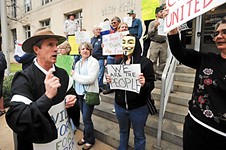Point Austin: What's in a Word?
Joseph Stack's terrorism calls attention to rampant political hypocrisy
By Michael King, Fri., Feb. 26, 2010

I hadn't initially planned on entering the discussion concerning whether Joseph Stack's suicidal attack on an Austin office of the Internal Revenue Service constituted "terrorism." Chronicle colleague Richard Whittaker had already pointed out on the Newsdesk blog that the attack certainly fit the standard definitions of the term, including, for pointed example, that of the FBI: "the unlawful use of force or violence against persons or property to intimidate or coerce a government, the civilian population, or any segment thereof, in furtherance of political or social objectives."
In his suicide manifesto, Stack himself had made the exact argument: Unless he added his "body to the count ... nothing will change." He hoped that his action would provoke an "inevitable double standard, knee-jerk government reaction" that would force others to see the light. And finally, "violence not only is the answer, it is the only answer."
And then Stack did as he promised, resulting in not only his own death but that of Vietnam veteran and longtime IRS employee Vernon Hunter and injuries to several other government workers – and only by good fortune, no additional deaths. Stack hoped that his desperately reckless, explicitly homicidal act would result first in repression, then eventually in political change. Murder in the service of political ideology is, by any honest definition, terrorism.
But in the aftermath, it hasn't seemed that simple. Initially, Austin Police Chief Art Acevedo rejected the "terrorism" description, instead calling the attack "a criminal act by a lone individual." But Acevedo's understandable purpose on the scene was to discourage panic over some wider conspiracy. "The main thing I want to put out there," he said, "is that this is an isolated incident here; there is no cause for alarm." Nevertheless, Republican Congressman Michael McCaul noted that attempting to kill federal employees "sounds like [terrorism] to me," and later Austin Democrat Lloyd Doggett issued an angry statement denouncing this "cowardly act of domestic terrorism."
Stack's action may have been isolated, and singular – though in recent years IRS employees are far too often the targets of threats or assaults – but it was certainly a violent act against government workers with the twisted intent of provoking political change.
On the Other Hand
Then followed the subsequent media coverage, which often seemed baffled at the thought that "terrorist" could refer to anyone but a foreigner with a beard. Georgetown University "terrorism expert" Bruce Hoffman, who should certainly know better, told the Fort Worth Star-Telegram that Stack's action was only a "cathartic outburst of violence." To meet the terrorism standard, Hoffman argued, "there has to be some political motive and it has to send a broader message that seeks some policy change." Such motive and message are both explicit in Stack's manifesto, but for some reason, that wasn't good enough for Hoffman.
It got worse. As Salon's Glenn Greenwald documented Feb. 19, the day after Stack's attack, the popular media immediately balked at describing political violence perpetrated by a white American citizen in the same terms they use routinely to describe political violence by nonwhites, citizens or not (particularly Muslims). On the Web, you'll find hairsplitting exercises by various writers on why the term doesn't apply to Stack. The most striking is Newsweek's posting of its internal news staff e-mail discussion (www.newsweek.com/id/233949/page/1) over the distinctions between Stack and the failed airline bomber, Umar Abdulmutallab, and why it makes journalistic sense to call the one a "tax protester" and the latter – who managed to kill nobody – a "terrorist." (Some staffers have since posted that they were snarking on the practices of other publications, but the higher up the editorial food chain, the less irony is apparent.)
As Greenwald wrote, "All of this would be an interesting though not terribly important semantic matter if not for the fact that the term Terrorist plays a central role in our political debates."
Word Games
Scarcely a week goes by that the Chronicle doesn't receive an overheated press release from Austin/San Antonio Congressman Lamar Smith denouncing "terrorists" and the Obama administration as being soft on "terrorism." Just this week Smith announced his sponsorship of the Keep Terrorists at Bay Act, which would forbid moving Guantánamo Bay prisoners to the U.S. for trial. That is, Smith wants to bar from U.S. courts prisoners only accused of violent acts (mostly by bounty hunters) against the U.S. who have been held for years without trial and some tortured – because as far as he's concerned, accusation and conviction are one and the same.
Here's how our congressman employs the term: "If the Obama administration persists in bringing terrorists to the U.S., then they leave Congress no choice but to remove their authority to do so. Guantanamo Bay was never meant to be an Ellis Island. Our immigration laws are not intended to facilitate the migration of terrorists to the U.S."
Last month, Smith found time to sponsor another bill that would deny Miranda rights to "foreign terrorists" apprehended in the U.S. – even though the Constitution guarantees due process of law to any person arrested on U.S. soil. Congressmen McCaul and Doggett immediately denounced the terrorist attack on the IRS. Judging from his press releases, Congressman Smith wakes every morning certain that the "terrorist" wolf is at our door and only he can save us. Yet so far as I can tell, after an extensive search, Smith has uttered not a single word about last week's successful terrorist attack in Austin.
I'm old enough to recall when the word "communist" was used as a bludgeon against any political enemy, with catastrophic social results. That's mostly faded away (although some tea partiers are trying desperately to revive it), but in recent years, "terrorist" or "terrorist sympathizer" has taken its place as an all-purpose epithet and as a vicious excuse for political excess, repression, and war. The Stack case has called attention to the term's fundamental hypocrisy. Maybe the next time a demagogue cries wolf, fewer Americans will listen.
Got something to say on the subject? Send a letter to the editor.











